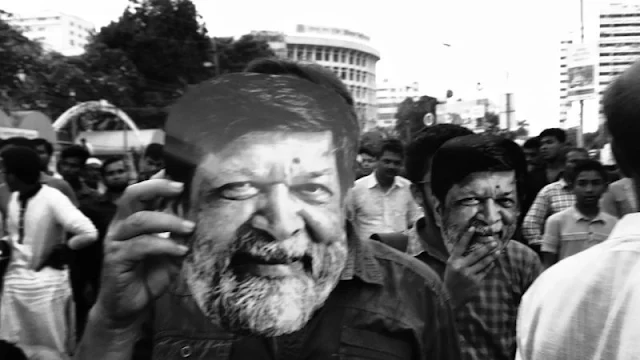Detained Bangladeshi photojournalist Shahidul Alam has once again been denied bail in a case filed under the Information, Communication and Technology Act (ICT) for instigating “students to continue a [recent] movement against the government” and “spreading propaganda against the government”. Alam and his acquaintances deny those charges.
Meanwhile, protests continued at home and abroad to release the photographer and other detained students. A number of students got bail a few weeks ago, but an unknown number are still detained.#Bangladesh's #HighCourt judges felt #embarassed to hear #BailPetition of #ArbitrarilyDetained #Protographer #ShahidulAlam after a day's delay for allowing #AttorneyGeneral a #chance to argue in favour of the #Government. Thus, #injustice takes its roots! https://t.co/LAj3iHpNGY— Ashraf Zaman (@ZamanAshraf) September 4, 2018
Alam was detained on August 5, 2018, officially arrested the next day, and ultimately sued under the ICT Act, to which his counsels submitted the bail petition on August 28.
On September 4, a two-member High Court bench felt ‘embarrassed’ to hear Alam's bail in the case. In Bangladeshi judicial practice, the judges can sometimes feel embarrassed to entertain cases demanding a fair and impartial dispensation of justice, especially if any party in the case is personally known, directly or indirectly, or if they fear they will be threatened or intimidated. Alam's counsels appealed to the High Court who directed the lower court concerned with the case to dispose of the plea by Tuesday.A #Bangladesh court has rejected bail for photographer Shahidul Alam, who was arrested after criticizing Prime Minister Sheikh Hasina in an interview. Here’s a smattering of his award-winning work. https://t.co/ESlMbpRIun— Sadanand Dhume (@dhume) September 11, 2018
11 Nobel Laureates and 17 Eminent Citizens call for the Unconditional Release of Dr Shahidul Alam of Bangladesh. To read the full statement please visit: https://t.co/Rq5IVU0sRi pic.twitter.com/LgFkOadXE0— Muhammad Yunus (@Yunus_Centre) September 2, 2018
Arrested for expressing his views
Alam was arrested in August after covering the student protests against ineffective traffic laws in Bangladesh on his Facebook and Twitter accounts and discussed the protests on Facebook Live.Thousands of secondary school students in the capital city of Dhaka took to the streets on July 29 in sustained protests lasing more than a week, demanding improved road safety and rule enforcement after two of their classmates were killed due to reckless driving by a public bus.
Alongside his social media coverage of the protests, Alam gave a television interview with Al Jazeera where he talked about the recent situation in Bangladesh and criticized the government.
Global outcry, artful protest
A number of international agencies, Nobel laureates, photography professionals, journalists and human rights organizations have urged the Bangladesh government to release Alam.Indian writer Arundhati Roy, American linguist Noam Chomsky, Canadian author Naomi Klein, American playwright Eve Ensler and Indian journalist Vijay Prasad have issued their second statement to the Bangladesh government to drop charges against Alam.
Amnesty International has declared Shahidul Alam as Amnesty International prisoner of conscience.
In Bangladesh, numerous protests and solidarity rallies have been organized in the past weeks to demand the unconditional release of Shahidul Alam and other detained protesters.
On September 4, the Drik Gallery hosted an exhibition of selected photos of Alam titled “A Struggle for Democracy” to highlight his struggles and honor the fact that he founded the picture gallery 29 years ago.
Alam is also the founder of the Pathshala South Asian Media Institute, a school of photography and multimedia journalism, and the Chobi Mela, a biannual International Festival of Photography.
On Sunday, September 9, a public gathering titled “Let democracy be free” was held at Shahbag Square in Dhaka to protest Alam's imprisonment along with several other students. Some of the images can found in this Instagram post:
Participants used art and performance to express their grievances.
One woman wore a paper bag which read “We are not supposed to have heads” and “we don't have tongues, words”. Another protestor sang and played guitar while wearing a makeshift cage. In front of the cage, a helmet and hammer were placed, signifying the pro-government vigilantes wearing helmets who attacked the student protestors using hammers.
A duct-taped camera was displayed along with a banner beside it that read “Let Democracy Be Free”.
Glad to hear Foreign Office are raising human rights abuses w/ authorities in Bangladesh in response to my #freeShahidulAlam letter to minister @MarkFieldUK One wonders if repressive government feels more able to get away with stuff now eyes of the world diverted to Rohinga pic.twitter.com/Jbd6eFjxKr— Rupa Huq MP (@RupaHuq) September 7, 2018












0 Comments:
Post a Comment